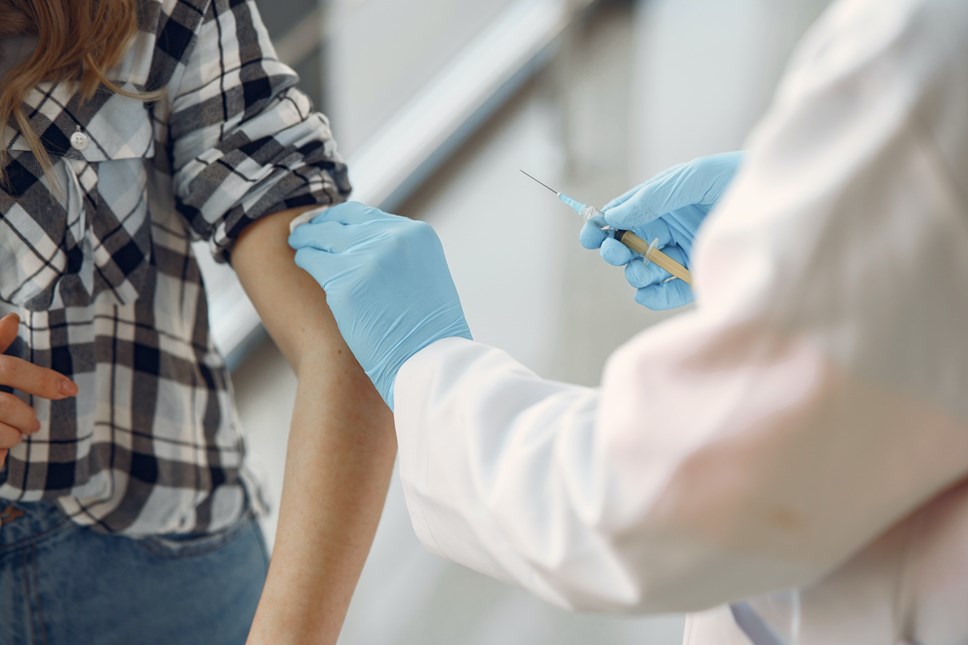
Covid-19 vaccine roll-out begins in Wales
Dechrau cyflwyno brechlynnau COVID-19 yng Nghymru
The first COVID-19 vaccine is being rolled-out across Wales from today (Tuesday 8 December 2020), the Welsh Government has confirmed.
Wales was the first country in the world to receive supplies of the vaccine last week, and has today become one of the first to begin protecting people against coronavirus.
The Welsh Government and NHS have been preparing for today since June.
The start of the vaccination programme comes just days after the Medicines and Healthcare Products Regulatory Agency (MHRA) approved the first Covid-19 vaccine for use in the UK, confirming its safety and effectiveness for mass vaccination centre use, based on a detailed independent expert review of the results of largescale clinical trials.
Some 40 million doses of the Pfizer-BioNTech vaccine will be available across the UK, with Wales getting its allocation based on its population. In the first wave of vaccine deliveries, Wales will receive almost 40,000 doses, enough for nearly 20,000 people.
All health boards will start administering vaccines to care home staff, those over 80 years and frontline health and social care workers most at risk – over 6000 doses will be given by the end of this week.
Despite the specific storage and preparation challenges posed by the vaccine, work continues to ensure a safe deployment of effective vaccine to care home residents.
First Minister Mark Drakeford, said:
“Last week, Wales was the first country in the world to receive supplies of the COVID-19 vaccine. Today, I’m very proud Wales has become one of the first countries in the world to begin the roll-out of the vaccine to its population.
“2020 has been a very difficult year for all of us. This vaccine is a small glimmer of light at the end of what has been a long and dark tunnel.
“But the fact we have a vaccine does not mean we can stop doing those things that keep us safe. We must all continue to do our bit to prevent the spread of coronavirus: regular hand washing, social distancing, and wearing a face covering where required to protect yourself and others.”
Health Minister Vaughan Gething said:
“Vaccines can take many years, even decades, to develop. The fact that a safe and effective vaccine has been developed in less than year is a remarkable tribute to all scientists and researchers around the world who have worked so hard to find a vaccine for COVID-19.
“We have been working really hard to plan for its arrival. Today, the first people in Wales will receive the vaccine. This is the positive news we have all been waiting for.
“We will now do everything we can to ensure we successfully deliver the COVID-19 vaccine across Wales in the days, weeks and months ahead.”
Notes to editors
The effects of the vaccine may not be seen for many months and the advice about keeping Wales safe remains in place:
- Keep contacts with other people to a minimum;
- Keep a 2 metre distance from others;
- Wash your hands regularly;
- Wear a face covering where required, and;
- Avoid touching surfaces others have touched, wherever possible.
The vaccine – which needs to be administered in two doses – will initially be prioritised and available for people aged 80 and over, care home staff and residents and those working within front line health and social care services at greatest risk.
The Pfizer-BioNTech vaccine needs to be stored at ultra-low temperatures, in special centres across Wales.
As further supplies become available and additional vaccines receive MHRA approval, a staged approach will enable other groups to be offered the vaccine.
Individuals in the priority groups for a vaccine will receive an invitation from their employer or health board providing information about the Covid-19 vaccine, telling them where to go and what to do on the day of their appointment. People are urged to wait to be invited, which will happen through NHS. Please do not ask your pharmacist or GP.
Work continues on models for care homes to be vaccinated as soon as possible, with the approved vaccine being taken to them using a mobile service, once cleared for this purpose. Housebound individuals will not be able to have this model because of vaccine wastage with multi-dose vials, and the Oxford vaccine will be preferable for this group.
The development process for coronavirus vaccines has been as stringent as the development of any other but the processes, in the face of the pandemic, have been sped up by prompt, world-wide funding and a reduction in paperwork. The clinical trials have not been shortened, and the usual safety measures remain in place.
The vaccine will not be mandatory and people will be able to choose whether they have the vaccine or not. Information will be provided to people before vaccination to reassure them about patient safety and robust consent processes will be in place.
